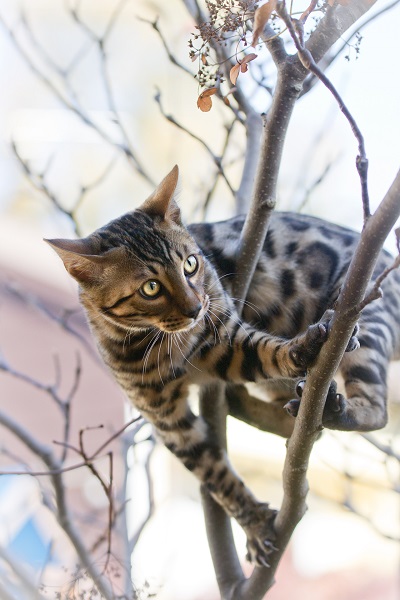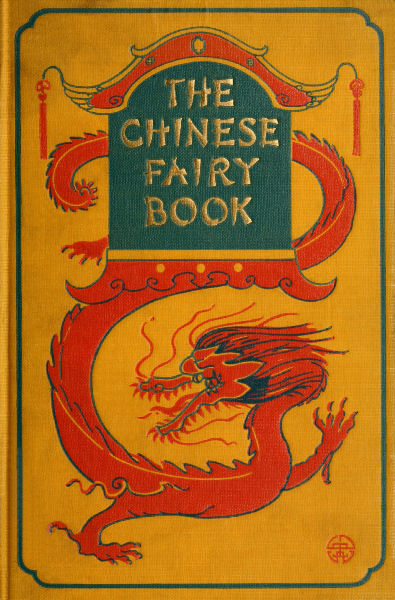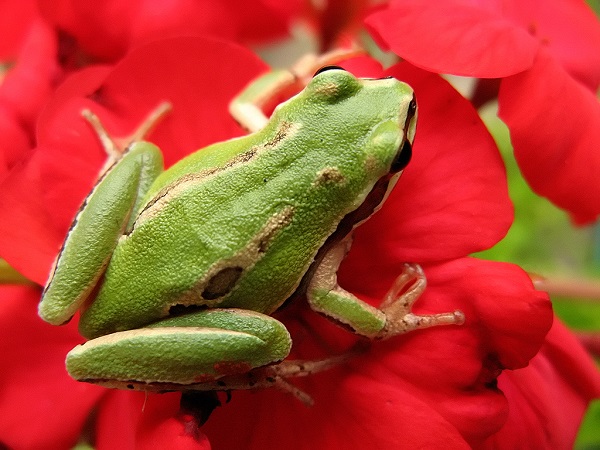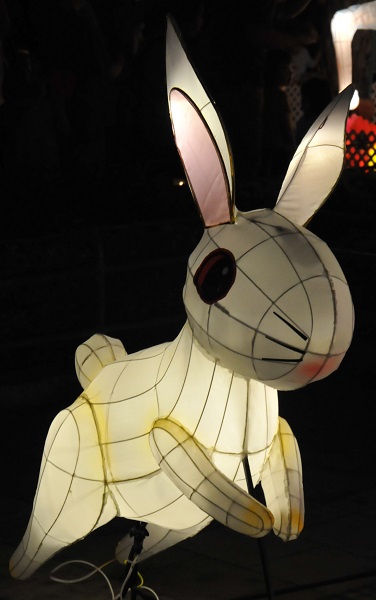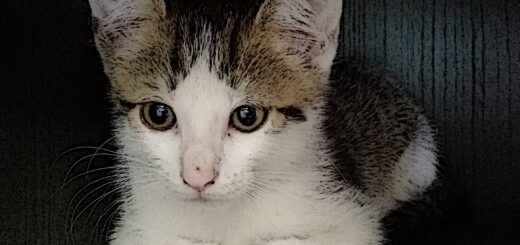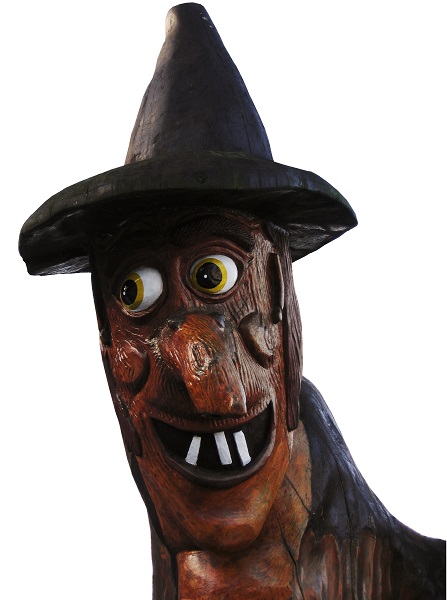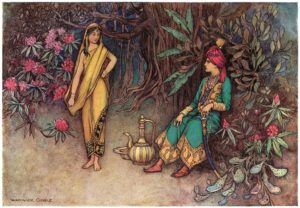Strike but Hear (Folk-Tales of Bengal, 1912) by Rev. Lal Behari Day
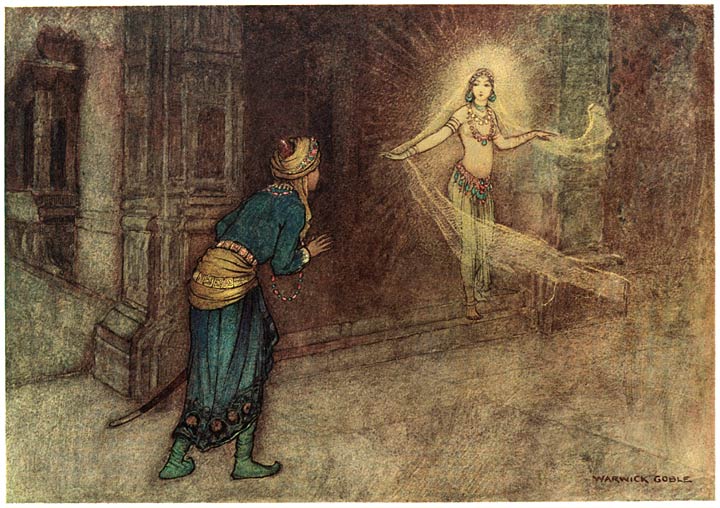
Once upon a time there reigned a king who had three sons. His subjects one day came to him and said, “O incarnation of justice! the kingdom is infested with thieves and robbers. Our property is not safe. We pray your majesty to catch hold of these thieves and punish them.” The king said to his sons, “O my sons, I am old, but you are all in the prime of manhood. How is it that my kingdom is full of thieves? I look to you to catch hold of these thieves.” The three princes then made up their minds to patrol the city every night. With this view they set up a station in the outskirts of the city, where they kept their horses. In the early part of the night the eldest prince rode upon his horse and went through the whole city, but did not see a single thief. He came back to the station. About midnight the second prince got upon his horse and rode through every part of the city, but he did not see or hear of a single thief. He came also back to the station. Some hours after midnight the youngest prince went the rounds, and when he came near the gate of the palace where his father lived, he saw a beautiful woman coming out of the palace. The prince accosted the woman, and asked who she was and where she was going at that hour of the night. The woman answered, “I am Rajlakshmi, the guardian deity of this palace. The king will be killed this night. I am therefore not needed here. I am going away.” The prince did not know what to make of this message. After a moment’s reflection he said to the goddess, “But suppose the king is not killed to-night, then have you any objection to return to the palace and stay there?” “I have no objection,” replied the goddess. The prince then begged the goddess to go in, promising to do his best to prevent the king from being killed. Then the goddess entered the palace again, and in a moment went the prince knew not whither.
The prince went straight into the bedroom of his royal father. There he lay immersed in deep sleep. His second and young wife, the stepmother of our prince, was sleeping in another bed in the room. A light was burning dimly. What was his surprise when the prince saw a huge cobra going round and round the golden bedstead on which his father was sleeping. The prince with his sword cut the serpent in two. Not satisfied with killing the cobra, he cut it up into a hundred pieces, and put them inside the pan dish2 which was in the room. While the prince was cutting up the serpent a drop of blood fell on the breast of his stepmother who was sleeping hard by. The prince was in great distress. He said to himself, “I have saved my father but killed my mother.” How was the drop of blood to be taken out of his mother’s breast? He wrapped round his tongue a piece of cloth sevenfold, and with it licked up the drop of blood. But while he was in the act of doing this, his stepmother woke up, and opening her eyes saw that it was her stepson, the youngest prince. The young prince rushed out of the room. The queen, intending to ruin the youngest prince, whom she hated, called out to her husband, “My lord, my lord, are you awake? are you awake? Rouse yourself up. Here is a nice piece of business.” The king on awaking inquired what the matter was. “The matter, my lord? Your worthy son, the youngest prince, of whom you speak so highly, was just here. I caught him in the act of touching my breast. Doubtless he came with a wicked intent. And this is your worthy son!” The king was horror-struck. The prince went to the station to his brothers, but told them nothing.
Early in the morning the king called his eldest son to him and said, “If a man to whom I intrust my honour and my life prove faithless, how should he be punished?” The eldest prince replied, “Doubtless such a man’s head should be cut off; but before you kill, you should see whether the man is really faithless.” “What do you mean?” inquired the king. “Let your majesty be pleased to listen,” answered the prince.
“Once on a time there lived a goldsmith who had a grown-up son. And this son had a wife who had the rare faculty of understanding the language of beasts; but neither her husband nor any one else knew that she had this uncommon gift. One night she was lying in bed beside her husband in their house, which was close to a river, when she heard a jackal howl out, ‘There goes a carcase floating on the river; is there any one who will take off the diamond ring from the finger of the dead man and give me the corpse to eat?’ The woman understood the jackal’s language, got up from bed and went to the river-side. The husband, who was not asleep, followed his wife at some distance so as not to be observed by her. The woman went into the water, tugged the floating corpse towards the shore, and saw the diamond ring on the finger. Unable to loosen it with her hand, as the fingers of the dead body had swelled, she bit it off with her teeth, and put the dead body upon land. She then went to her bed, whither she had been preceded by her husband. The young goldsmith lay beside his wife almost petrified with fear, for he concluded after what he saw that his wife was not a human being but a Rakshasi. He spent the rest of the night in tossing in his bed, and early in the morning spoke to his father in the following manner: ‘Father, the woman whom thou hast given me to wife is not a real woman but a Rakshasi. Last night as I was lying in bed with her, I heard outside the house, towards the river-side, a jackal set up a fearful howl. On this she, thinking that I was asleep, got up from bed, opened the door, and went out to the river-side. Surprised to see her go out alone at the dead hour of night, I suspected evil and followed her, but so that she could not see me. What did she do, do you think? O horror of horrors! She went into the stream, dragged towards the shore the dead body of a man which was floating by, and began to eat it! I saw this with mine own eyes. I then returned home while she was feasting upon the carcase, and jumped into bed. In a few minutes she also returned, bolted the door, and lay beside me. O my father, how can I live with a Rakshasi? She will certainly kill me and eat me up one night.’ The old goldsmith was not a little shocked to hear this account. Both father and son agreed that the woman should be taken into the forest and there left to be devoured by wild beasts. Accordingly the young goldsmith spoke to his wife thus: ‘My dear love, you had better not cook much this morning; only boil rice and burn a brinjal, for I must take you to-day to see your father and mother, who are dying to see you.’ At the mention of her father’s house she became full of joy, and finished the cooking in no time. The husband and wife snatched a hasty breakfast and started on their journey. The way lay through a dense jungle, in which the goldsmith bethought himself of leaving his wife alone to be eaten up by wild beasts. But while they were passing through this jungle the woman heard a serpent hiss, the meaning of which hissing, as understood by her, was as follows: ‘O passer-by, how thankful should I be to you if you would catch hold of that croaking frog in yonder hole, which is full of gold and precious stones, and give me the frog to swallow, and you take the gold and precious stones.’ The woman forthwith made for the frog, and began digging the hole with a stick. The young goldsmith was now quaking with fear, thinking his Rakshasi-wife was about to kill him. She called out to him and said, ‘Husband, take up all this large quantity of gold and these precious stones.’ The goldsmith, not knowing what to make of it, timidly went to the place, and to his infinite surprise saw the gold and the precious stones. They took up as much as they could. On the husband’s asking his wife how she came to know of the existence of all this riches, she said that she understood the language of animals, and that the snake coiled up hard by had informed her of it. The goldsmith, on finding out what an accomplished wife he was blessed with, said to her, ‘My love, it has got very late to-day; it would be impossible to reach your father’s house before nightfall, and we may be devoured by wild beasts in the jungle; I propose therefore that we both return home.’ It took them a long time to reach home, for they were laden with a large quantity of gold and precious stones. On coming near the house, the goldsmith said to his wife, ‘My dear, you go by the back door, while I go by the front door and see my father in his shop and show him all this gold and these precious stones.’ So she entered the house by the back door, and the moment she entered she was met by the old goldsmith, who had come that minute into the house for some purpose with a hammer in his hand. The old goldsmith, when he saw his Rakshasi daughter-in-law, concluded in his mind that she had killed and swallowed up his son. He therefore struck her on the head with the hammer, and she immediately died. That moment the son came into the house, but it was too late. Hence it is that I told your majesty that before you cut off a man’s head you should inquire whether the man is really guilty.”
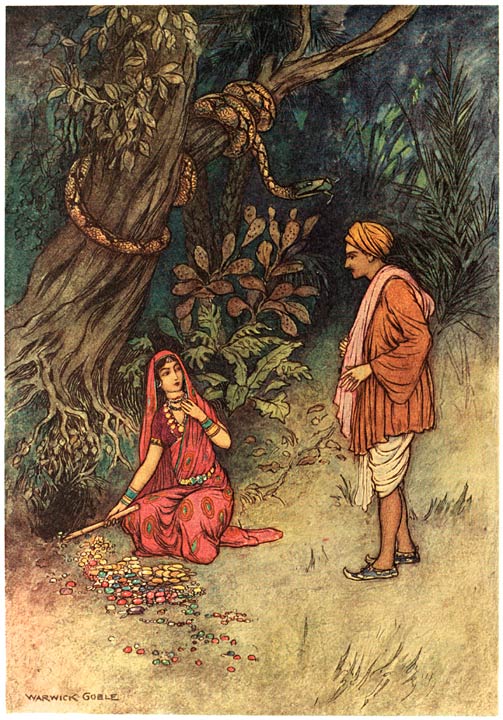 “‘Husband, take up all this large quantity of gold and these precious stones’”
“‘Husband, take up all this large quantity of gold and these precious stones’”The king then called his second son to him, and said, “If a man to whom I intrust my honour and my life prove faithless, how should he be punished?” The second prince replied, “Doubtless such a man’s head should be cut off, but before you kill you should see whether the man is really faithless.” “What do you mean?” inquired the king. “Let your majesty be pleased to listen,” answered the prince.
“Once on a time there reigned a king who was very fond of going out a-hunting. Once while he was out hunting his horse took him into a dense forest far from his followers. He rode on and on, and did not see either villages or towns. He became very thirsty, but he could see neither pond, lake, nor stream. At last he found something dripping from the top of a tree. Concluding it to be rain-water which had rested in some cavity of the tree, he stood on horseback under the tree and caught the dripping contents in a small cup. It was, however, no rain-water. A huge cobra, which was on the top of the tree, was dashing in rage its fangs against the tree; and its poison was coming out and was falling in drops. The king, however, thought it was rain-water; though his horse knew better. When the cup was nearly filled with the liquid snake-poison, and the king was about to drink it off, the horse, to save the life of his royal master, so moved about that the cup fell from the king’s hand and all the liquid spilled about. The king became very angry with his horse, and with his sword gave a cut to the horse’s neck, and the horse died immediately. Hence it is that I told your majesty that before you cut off a man’s head you should inquire whether the man is really guilty.”
The king then called to him his third and youngest son, and said, “If a man to whom I intrust my honour and my life prove faithless, how should he be punished?” The youngest prince replied, “Doubtless such a man’s head should be cut off, but before you kill you should see whether the man is really faithless.” “What do you mean?” inquired the king. “Let your majesty be pleased to listen,” answered the prince.
“Once on a time there reigned a king who had in his palace a remarkable bird of the Suka species. One day as the Suka went out to the fields for an airing, he saw his dad and dam, who pressed him to come and spend some days with them in their nest in some far-off land. The Suka answered he would be very happy to come, but he could not go without the king’s leave; he added that he would speak to the king that very day, and would be ready to go the following morning if his dad and dam would come to that very spot. The Suka spoke to the king, and the king gave leave with reluctance as he was very fond of the bird. So the next morning the Suka met his dad and dam at the place appointed, and went with them to his paternal nest on the top of some high tree in a far-off land. The three birds lived happily together for a fortnight, at the end of which period the Suka said to his dad and dam, ‘My beloved parents, the king granted me leave only for a fortnight, and to-day the fortnight is over: to-morrow I must start for the city of the king.’ His dad and dam readily agreed to the reasonable proposal, and told him to take a present to the king. After laying their heads together for some time they agreed that the present should be a fruit of the tree of Immortality. So early next morning the Suka plucked a fruit off the tree of Immortality, and carefully catching it in his beak, started on his aerial journey. As he had a heavy weight to carry, the Suka was not able to reach the city of the king that day, and was benighted on the road. He took shelter in a tree, and was at a loss to know where to keep the fruit. If he kept it in his beak it was sure, he thought, to fall out when he fell asleep. Fortunately he saw a hole in the trunk of the tree in which he had taken shelter, and accordingly put the fruit in it. It so happened that in that hole there was a snake; in the course of the night the snake darted its fangs on the fruit, and thus besmeared it with its poison. Early before crow-cawing the Suka, suspecting nothing, took up the fruit of Immortality in its beak, and began his aerial voyage. The Suka reached the palace while the king was sitting with his ministers. The king was delighted to see his pet bird come again, and greatly admired the beautiful fruit which the Suka had brought as a present. The fruit was very fair to look at; it was the loveliest fruit in all the earth; and as its name implies it makes the eater of it immortal. The king was going to eat it, but his courtiers said that it was not advisable for the king to eat it, as it might be a poisonous fruit. He accordingly threw it to a crow which was perched on the wall; the crow ate a part of it; but in a moment the crow fell down and died. The king, imagining that the Suka had intended to take away his life, took hold of the bird and killed it. The king ordered the stone of the deadly fruit, as it was thought to be, to be planted in a garden outside the city. The stone in course of time became a large tree bearing lovely fruit. The king ordered a fence to be put round the tree, and placed a guard lest people should eat of the fruit and die. There lived in that city an old Brahman and his wife, who used to live upon charity. The Brahman one day mourned his hard lot, and told his wife that instead of leading the wretched life of a beggar he would eat the fruit of the poisonous tree in the king’s garden and thus end his days. So that very night he got up from his bed in order to get into the king’s garden. His wife, suspecting her husband’s intention, followed him, resolved also to eat of the fruit and die with her husband. As at that dead hour of night the guard was asleep, the old Brahman plucked a fruit and ate it. The woman said to her husband, ‘If you die what is the use of my life? I’ll also eat and die.’ So saying she plucked a fruit and ate it. Thinking that the poison would take some time to produce its due effect, they both went home and lay in bed, supposing that they would never rise again. To their infinite surprise next morning they found themselves to be not only alive, but young and vigorous. Their neighbours could scarcely recognise them—they had become so changed. The old Brahman had become handsome and vigorous, no grey hairs, no wrinkles on his cheeks; and as for his wife, she had become as beautiful as any lady in the king’s household. The king, hearing of this wonderful change, sent for the old Brahman, who told him all the circumstances. The king then greatly lamented the sad fate of his pet bird, and blamed himself for having killed it without fully inquiring into the case.
“Hence it is,” continued the youngest prince, “that I told your majesty that before you cut off a man’s head you should inquire whether the man is really guilty. I know your majesty thinks that last night I entered your chamber with wicked intent. Be pleased to hear me before you strike. Last night as I was on my rounds I saw a female figure come out of the palace. On challenging her she said that she was Rajlakshmi, the guardian deity of the palace; and that she was leaving the palace as the king would be killed that night. I told her to come in, and that I would prevent the king from being killed. I went straight into your bedroom, and saw a large cobra going round and round your golden bedstead. I killed the cobra, cut it up into a hundred pieces, and put them in the pan dish. But while I was cutting up the snake, a drop of its blood fell on the breast of my mother; and then I thought that while I had saved my father I had killed my mother. I wrapped round my tongue a piece of cloth sevenfold and licked up the drop of blood. While I was licking up the blood, my mother opened her eyes and noticed me. This is what I have done; now cut off my head if your majesty wishes it.”
The king filled with joy and gratitude embraced his son, and from that time loved him more even than he had loved him before.
Thus my story endeth,
The Natiya-thorn withereth, etc.
If you liked this story, leave me a comment down below. Join our Facebook community. And don’t forget to Subscribe!
Enjoy other folk tales from India!

